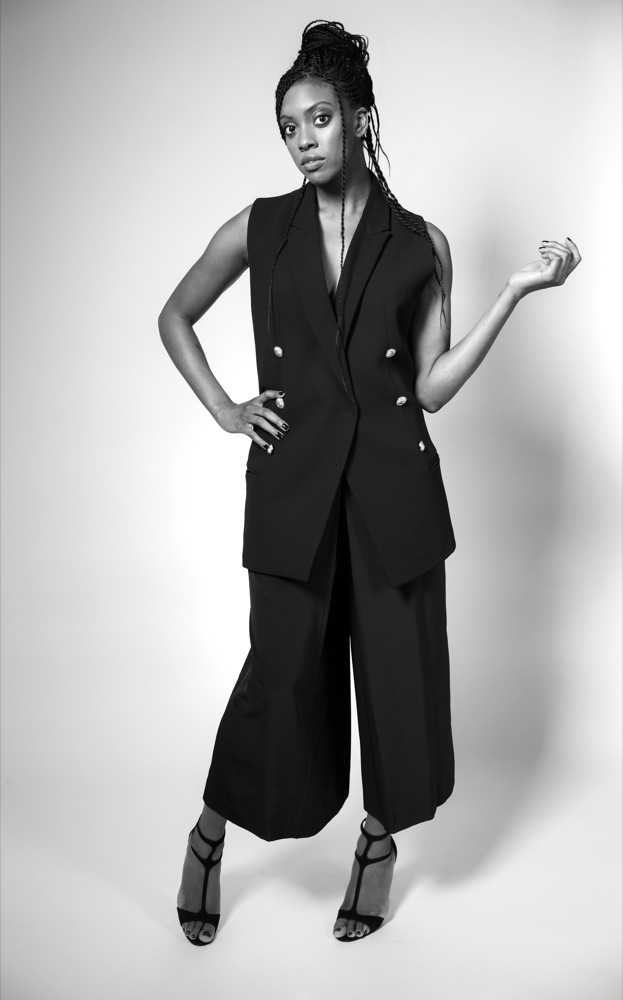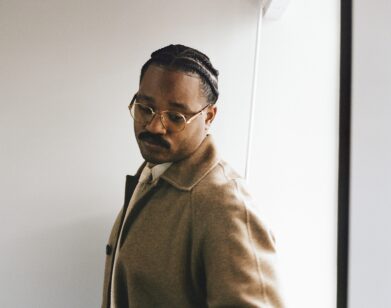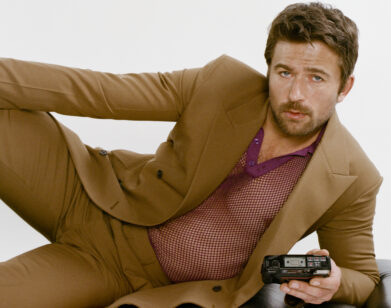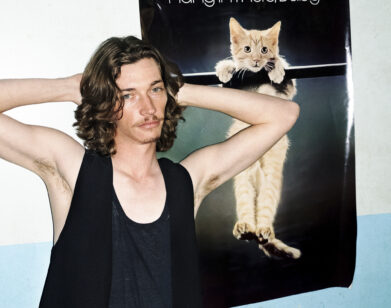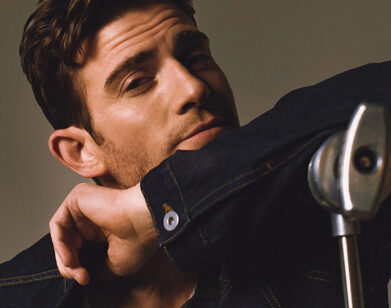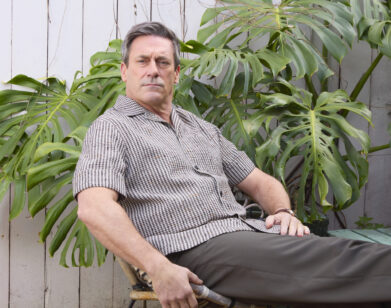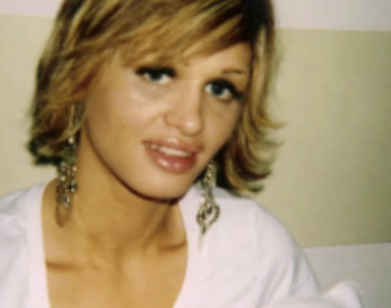Condola Rashad
CONDOLA RASHAD IN NEW YORK CITY, JANUARY 2016. PHOTOS: FRANK SUN. STYLING: CLAUDIA CIFU. HAIR: JEROME CULTRERA/SEE MANAGEMENT USING R & CO. MAKEUP: YACINE DIALLO/BRIDGE USING GIORGIO ARMANI BEAUTY. RETOUCHING: DUTTY VANNIER.
“She’s the problem solver, and quietly, but confidently so,” says Condola Rashad of Kate Sacher, her character in Showtime’s new series Billions. “The ambitious, young whipper-snapper who got to where she is now because she’s worked so hard.”
Set in the morally dubious world of New York’s ultra-rich, Billions focuses on the feud between hedge fund founder Bobby Axelrod (Damian Lewis) and U.S. Attorney Chuck Rhoades (Paul Giamatti). Kate works for Rhoades, and where her boss is impetuous and guided by personal biases, Kate is calm and smart. It is Kate, for example, who realizes that one of her coworkers is leaking information to Axelrod’s “fixer.” As the series unfolds, we begin to learn other things about her, too. Like her boss Rhoades, Kate comes from a very wealthy background and has grand ambitions (she wants to be president). Needless to say, she wears her financial privilege and political aspirations very differently than Rhoades. Clashing male egos might drive the conflict in the show, but it is the female characters—like Kate and Rhoades’s wife Wendy (Maggie Siff)—that make it complex and compelling.
Billions is Rashad’s first television show as series regular. The 29-year-old, New York-native studied acting at Cal Arts and began her career on stage. She’s earned two Tony and two Drama Desk Award nominations for her performances in Lynn Nottage’s Ruined and Horton Foote’s The Trip to the Bountiful. Three years ago, she starred opposite Orlando Bloom in Romeo and Juliet. More recently, she’s been transitioning to film, with roles in Joshua Marston’s Sundance drama Complete Unknown with Rachel Weisz and Michael Shannon and Jodie Foster’s Money Monster with George Clooney and Julia Roberts.
As the youngest child of actress Phylicia Rashad and former NFL player and sportscaster Ahmad Rashad, acting might seem like an obvious career choice, but Condola is the only one of her four siblings to pursue a career in the arts. “My sister is actually an attorney,” says Rashad. “When I found out that I got Billions she was like, ‘You jerk, you’re literally playing the job that I want to have.'”
EMMA BROWN: How did you get involved in Billions?
CONDOLA RASHAD: I auditioned on my birthday, actually, in 2014. Once I had read this script, I knew it was something, and because it was my birthday, I went in with this sense of, “It’s my birthday, so…” [laughs] I just felt very confident. Then I didn’t really think really much of it in terms of expectations; when you audition for something and you just want it so bad you often don’t get it. Originally the character of Kate Sacher was for a guest star, possibly recurring, so I was just excited for that. Then I got word that they were trying to make it into a regular, and about a month later we were shooting the pilot.
BROWN: I like Kate. She’s the competent one.
RASHAD: Yeah. She takes her job pretty seriously. It’s funny, throughout the entire season, whenever I had an answer to something, even if it was off set, I’d be like, “Oh, problem solver.” [laughs]
BROWN: Then a few episodes in, you find out that Kate comes from a very wealthy family.
RASHAD: That was really fun to play around with. It’s something that we tried to play delicately with in terms of that being a part of her personal history—she’s not ashamed of it, but she doesn’t wear it on her sleeve. It’s just something that it is, take it or leave it. It’s not how she got there.
BROWN: The tension in the show comes from this rivalry between Bobby Axelrod and Chuck Rhoads. It can be quite frustrating, because there’s really no need for them to go after each other, and yet they do anyway.
RASHAD: There are a lot of things involved. There’s pride involved—it’s a little bit of a pissing contest in certain ways between these very dominant male figures, and you watch their wives trying to figure out why. That’s something that over the first season we really start to dig into: Why it is it that these two people are pitted against each other? Even by the [end of] the first season, you don’t have all of the answers yet. They both have technical reasons, but really what is it really about? I think that’s a big question that is posed on the show. You can even take it outside the context of the show, when there are these head-on confrontations between two powerful men, what does it come down to?
BROWN: I was thinking about those idiots who say, “Women shouldn’t be president because they’re too emotional.” I want them to watch this as an example of why men shouldn’t be president, because this wouldn’t happen between two women.
RASHAD: It really wouldn’t. It’s so true.
BROWN: There’s that famous story about how, when Dominic West signed onto The Wire, he was told it would get cancelled after a season and then it ended up lasting five seasons. Is that something you think about when deciding whether or not to do a show?
RASHAD: For me, I’ve always been picky about television for that reason. My thing is that if you don’t really connect to something or see that it’s going to be something you’re going to be proud of, I wouldn’t do it. With cable, it’s different because we’re doing 12 episodes versus 20. I have a friend who’s on a network show and she’s shooting for eight months out of the year, which is a big difference from five months out of the year. I know it doesn’t seem like a big difference but it is. [laughs] But to me it’s a perfect amount of time. Also I come from the theater world, so I did a Lynn Nottage play called Ruined for a year and a half. We did it in Chicago and then we came back here. We kept almost closing and then it kept getting extended. After that, we ended up going to Seattle and Los Angeles. That’s been the most grueling [project] in terms of amount of time I’ve had to put into something.
BROWN: When you’re doing something for so long, is there a temptation to change what your doing with your character from night-to-night just to do something new?
RASHAD: There might be an urge to do that, but, technically, you’ve got to learn to fight it. The big challenge is finding something new without changing completely what you’ve already done—going deeper into what you’ve already done and discovering new things while carrying out the same intention. I have been in shows with actors who try to spice it up, and often they start to lose track. They don’t realize that to deepen it even for yourself, it’s more about what you do internally. To be like, “Today I’m actually going to put this in a different place” doesn’t actually carry the story more, it just makes things more confusing: “Great. That’s going to mess up lighting.” [laughs]
BROWN: Did you study theater at Cal Arts?
RASHAD: Yes, four years of theater at Cal Arts. It was between Carnegie Mellon and Cal Arts. I love Carnegie Mellon; I think Carnegie Mellon has a great program. I got in for musical theater because I’m a singer as well. So it was either musical theater there or acting at Cal Arts. Part of me wanted to go to Carnegie because it’s such a great school. [But] when I visited Cal Arts, I was like, “This is definitely where I want to go.” I love my parents—love them to death—but I wanted to go somewhere where they had to take a plane and not just drive [to visit me]. [laughs] ‘Cause they would just show up. Also, what was cool about Cal Arts was that it really gives you space to work on things that are quite avant-garde. That was exciting to me. I realized that once I graduated from college, there might be a period of time where people might typecast me or be more limiting, and I might not be able to play a crazy character. For me, it was important to do that at least in school. After I graduated, it didn’t really matter if I got typecast for a minute, because I knew where I was going and I knew what I could do. I’d already gone to certain places that, sure, I might not ever get to do professionally, but I know I can. My view of myself as an artist expanded because of the time I spent at Cal Arts.
BROWN: Was there any one performance that you are particularly proud of?
RASHAD: So far, just because of the work itself, Ruined. It was a grueling play; it was about the war in the Congo and how it affected the women. I was able to do what I love to do, which is tell a story, but also the story that I was telling was so important. I was able to do what I was good at, but also give back to society in a way that made me feel very proud. I felt very proud every day just telling that story to a group of people. I felt that we were offering something that was really getting people to think and was provoking change, which, for me, is the goal as an actor.
BROWN: When you go to the theater or watch films, what are you hoping to take away from the experience? Do you watch films to learn something or as a means of escape?
RASHAD: I’ve realized that a lot of people go to see film or theater with a different expectation. I have a friend who’s an actor and I can’t stand watching movies with him because he never quite allows himself to just watch the story. He’ll comment on the lighting, he’ll comment on the [camera] angle. I’m not saying there’s a wrong way to watch it—maybe that’s helpful to him—but to me, you’re getting way too caught up in the technical aspects. My favorite films are when all of those technicalities are so seamless and so well done that I’m not thinking about them—you’re able to go full-on into the story versus talking about edgy this moment was. But it’s a very removed way of looking at it. It’s the same way I feel about actors, too. Paul Giamatti is truly one of my biggest inspirations, and even more so now that I’ve gotten to work with him. Every single thing he does, he completely transforms into it. When I watch a film with Paul in it, I’m not like, “Oh, there’s Paul.” I’m completely into whatever character he’s in and I’m not thinking about him as an actor. There are a lot of celebrities that I think can get a little bit distracted by the way that our society views celebrity. All of a sudden, the film becomes about, “Come see this celebrity!” I’m not interested in that. I want to see a story. What is it that you’re offering? Not just, “Look at me,” or “How edgy am I in this role?” It’s the opposite of giving. I think that, as an actor, it’s a gift.
BROWN: Obviously your mother is an actress, but did you grow up watching a lot of movies or going to the theater a lot?
RASHAD: I went to the theater a lot. But I went to the theater with my mom. When I was a baby, she was on The [Cosby] Show, but once I got to five or six, she had gone back to theater. She comes from the theater—a lot of people don’t know that because they only know her as Claire Huxtable, which she doesn’t mind, but really it’s just a part of the spectrum of what she’s done.
BROWN: Now they know her as Apollo Creed’s wife.
RASHAD: [laughs] Yeah, which is awesome. I’m so happy for her and was really proud to see her work in that. I thought she was great. But I grew up in the theater with my mom and that’s how I knew I wanted to be an actor in the first place. My mom was really busy when I was growing up, but she did a really good job in terms of balancing her home life with her professional life. She basically took me everywhere. She was like, “If I have rehearsal, I’m just going to bring you.” The directors were often really nice and I was well behaved, so I would just sit there in rehearsal. That allowed me to see the process—not just the result, the red carpet, all of the wonderful, fun things that happen afterwards—the nuts and bolts, the nitty-gritty, “Let’s try to build this character from the page,” tech rehearsals.
BROWN: When you first voiced interest in becoming and actor, was your mother happy about it?
RASHAD: I think even when I was little there was signs that I was an artist. I’ve always been an artist. My first exploration through art was really through music—I’ve trained classically with piano for about ten years. After that, when I was at school, I would write music and I actually released an album with my band [The Stoop Kids]. I think that my parents knew that I was going to go into some part of the field. But my sister recently told me that she was shocked when I went to school for acting because she was sure that I was going to go to school for music.
BROWN: Did you consider just studying music?
RASHAD: No. I wanted to become an actor and I knew that if I was really going to do it, I needed the training. I was not one of those people that was like, “I got it.” I was like, “No, I don’t have it yet. I need work. I need help fixing myself.”
BROWN: Did you get your Actors’ Equity card before your SAG card?
RASHAD: I did. I got my equity card through Ruined, the first show I did. I got into Ruined about two months after graduating.
BROWN: Did you have two months of panic before that?
RASHAD: I didn’t. I came out expecting it to be really hard, and I think because I expected that, I approached every audition with a certain amount of ease. I was like “I’m probably not going to get this because I’ve just graduated, so why would I?”
BROWN: You’re also in Joshua Marston’s Complete Unknown, which screened at Sundance.
RASHAD: Yeah. I was really honored to be in that film because we had to watch one of [Joshua Marston’s] first films, Maria Full of Grace, in high school. I love that movie. When I heard it was him, I was like, “That’s great.” I went in and I met him and luckily he’s a theater fan. We shot that in April. It was actually one of the most memorable experiences on camera that I’ve had just because of what it was. There’s a dinner party that happens, and my character is there during the dinner party. For about seven to nine days, six of us just shot the dinner party. So we actually felt like we were at the dinner party for like nine days. It was awesome, except for the fact that we had one scene when we’re we literally sitting at the dinner table—it was a 14-hour day and we had to eat. [Joshua] was like, “We want to see you guys eating.” At first I was like, “I love food and I love to eat” and then after the fourth hour, we were all trying so hard not to be sick. For a good month after that I could not eat salad, because we ate salad for 14 hours. By the end of it we were all delirious. We were doing night shoots so it was this twilight zone of a dinner party.
BROWN: Do people often mention your theater work when they bring you in for film auditions?
RASHAD: Yeah! That was a big reason why I moved here after graduating. I had a lot of friends that chose a different route and stayed in Los Angeles. Personally, especially as a young black woman, I didn’t think that Los Angeles was a place for me to start. There’s a certain type that they go for or don’t. When I’m in Los Angeles, sometimes I hesitate saying that I’m an actor because people are like, “Of course you are.” And I’m like “No, not, ‘Of course I am.'” In L.A., being an actor is like a pastime, everybody there is like, “I was on this reality show; I’m an actor.” It becomes a word that is loosely thrown around. But here, [in New York,] when you say you’re an actor, there’s a certain level of respect that goes with that. I had a really interesting experience when I graduated. I already knew I was moving back here, but I had a showcase with my school here and in L.A. Here it went well. I found my first set of agents and it was great. In L.A., there was this agent—it felt like such a Los Angeles experience, and I love Los Angeles, but it felt like a stereotypical bad side of L.A.—he came up to me after the showcase he was like, “You need to stay in Los Angeles. Can I just tell you why you need to stay in Los Angeles? How do I say it…ethnicity is so hot right now.” [laughs] I was like “I’m going to go…thank you, you just bought my plane ticket.” That kind of mentality made me a little L.A.-shy for a bit.
BILLIONS AIRS SUNDAY NIGHTS ON SHOWTIME.

